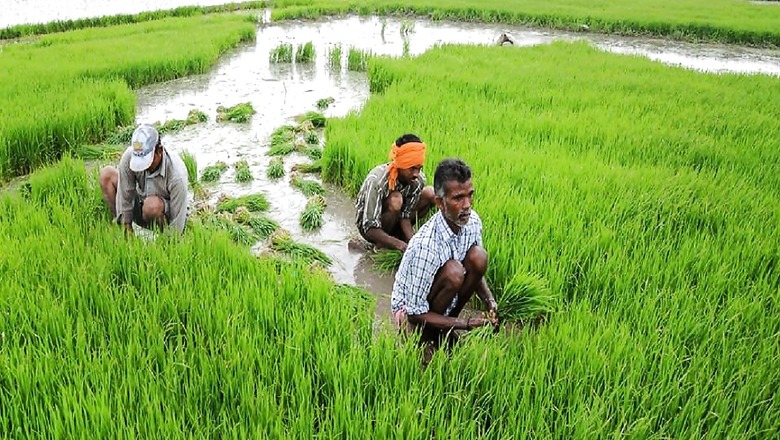
views
Contract farming is an age-old practice. In this system, agribusiness firms deal directly with farmers under the legal norms of a country. And the practice can directly help millions of small-scale farmers, in theory.
Small farmers are normally not associated with markets. They form the majority in developing countries and are mostly poor. In India, around 82% farmers are just marginal and small-level cultivators who somehow survive on the small tracts of the farmland they possess.
According to NABARD’s All India Rural Financial Inclusion Survey (NAFIS), the average monthly income of an agricultural household in 2015-16 was Rs 9,000 per month and with an outstanding debt of Rs 91,407.
Poverty makes small-scale farmers a vulnerable community in India, especially when they are perennially dependent on monsoon rains.
According to the Indian Council of Agriculture Research (ICAR), less than half of India’s farmlands or 48.8% of the 140 million hectare cropland area is irrigated while 51.2% is rainfed.
That means an average economic loss of 15-18% to the agriculture sector and thus to the farmers due to climate changes in a country driven by monsoon rains, an analysis by the Economic Survey says. For unirrigated land, the average economic loss is even more, in the range of 20-25%.
The extreme conditions the Indian farmers live in can be understood by the fact that every day 28 people related to agriculture take their own life in India, and poverty and failed crops are major factors behind it. Most of them cannot think of arranging irrigation for their farmlands, have no savings to take care of their needs in a drought year, find it hard to meet the basic requirements of the family, and end up taking loans either to grow crops or to meet family needs. A cycle that starts a phase of excruciating pain that in many cases ends in suicide due to loan burden.
The redressal for farmers means direct access to markets, excluding the intervention of middlemen to increase their post-sowing profits. Farmers need access to good irrigation facilities and advanced farm technologies to produce better quality crops that would fetch them a better price. An efficient supervisory mechanism is needed to ensure their interests are protected when they directly deal with agribusinesses.
Contract farming, theoretically, can bring in that mechanism in India.
Contract farming can give them assured markets. Agribusiness firms can give them technical assistance on advanced farm processes and inputs like irrigation and credit that a modern agricultural chain requires. And a system-driven contract farming approach where the state’s government is the main proposer can weed away abusive and selfish approaches by the agribusinesses.
Numerous studies conducted across the world over the years show contract farming has, in fact, helped small-scale farmers. Analytical reports published by agencies like the World Bank and others point out how contract farming can raise farmers’ income and agribusiness firms are willing to work with small-scale farmers as they can convince them to grow the type of crop they need as per market requirements.
An analytical World Bank report by Nicholas Minot and Loraine Ronchi on contract farming in many countries says the system can play a positive role in inclusive growth and poverty reduction as farm size is not a significant determinant in contract farming agreement.
Another study by Agence Francaise De Developpement (AFD), “Contract Farming in Developing Countries – A Review”, says small-scale farmers see greater participation when there is less inequality in landholding size and that should be seen as a blessing for India where most farmers have below one hectare of farmland.
A study done by Ramaswami, Birthal and Joshi in 2006 on contract farming for poultry in India and published in a World Bank document found the participants of the research earned 36% more per kilogram per production cycle than independent growers. Another study done by Birthal Jha, Tionco and Narrod in 2008 on dairy, poultry and vegetables found contract farming increased net revenue by 80% compared to the average. Narayanan in his study in 2014 on gherkins, papaya, marigold and poultry found profits of gherkin farmers rose by 21%, papaya farmers by 32%, poultry farmers by 150%, but marigold farmers saw their revenue go down by 49%.
Positive reports on contract farming from other countries like Senegal show groundnut farmers earned 55% more than non-contract farmers; in Indonesia poultry farmers earned 71% more and maize farmers earned 160% more; and in South Africa contract farmers registered a sevenfold increase in income.
There are many more such positive reports on contract farming from several other developing countries. The AFD report lists nine successful cases of contract farming studies from India, three from Kenya and two each from Senegal and Burkina Faso.
It’s true that contract farming agreements fail as well, but that doesn’t normally happen, as the World Bank’s analytical report puts out, “Studies of contract farming in developing countries suggest that it almost always results in higher income compared to that of similar farmers not on contract.”
The contract farming approach, introduced through the three new farm laws by India, may make that a possibility if implemented well with an efficient supervision mechanism.
With the farm reforms, farmers can now enter into business agreements with agriculture firms, wholesalers, big retailers and exporters. The laws introduced insulate them from price vagaries. Small farmers will get a guaranteed fixed price with more options to sell their product at their choice without involvement of middlemen and government procuring agencies.
The new farm laws introduce alternative trading channels with remunerative prices while securing the landholding rights of farmers, giving them a protective framework. Also, the agreement between farmer and buyer before production will ensure a transparent ecosystem empowering farmers to engage with buyers.
Read all the Latest News, Breaking News and Coronavirus News here




















Comments
0 comment